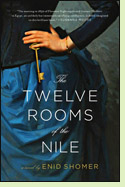The Twelve Rooms of the Nile
by Enid Shomer
Reviewed by Margaret Donsbach

The Twelve Rooms of the Nile is an extended metaphor: a meeting of minds and hearts that may never have taken place, but which stands for the crucible through which two people must somehow have passed to reach their laborious freedom, the work that would define their lives. In ancient Egyptian mythology, the sun-god died with every sunset and "traveled through the underworld on an infernal river divided into twelve rooms, one for each hour of the night. Emerging each morning at sunrise he assured the continuation of the world."
In 1850, Florence Nightingale and Gustave Flaubert, tormented souls both, each toured the Nile Valley. Florence was the product of a respectable English upbringing under the tutelage of a governess charged to root out passion and individuality and, in their place, instill decorous inactivity. Gustave had produced the manuscript of a novel, The Temptation of Saint Anthony. "It's about goodness and temptation, but mostly about goodness," he tells Florence in The Twelve Rooms of the Nile, "Which is why, my friends tell me, it is perfectly dull and should be fed to the flames." Florence, too, is a failure. "I have a tragic flaw," she tells Gustave. "I want to change the world, make a mark in it. This is not acceptable. I have a mind and wish to use it, which is considered a great failing in a woman."
In Egypt, they confront the despair within themselves. In the stale air of an underground temple, they speak to each other with a racking honesty their societies would condemn as monstrous. But they are in a monstrous land bedecked with gigantic, sand-choked, repetitive Ramses statues: "the pairs of disproportionate legs, the hands like flounders in the laps," a multiplied face which "combined serenity with absolute power." An unusual, transforming friendship begins. By novel's end, Florence and Gustave have exited the night's twelve houses to embark upon their futures. (2012, 449 pages)
More about The Twelve Rooms of the Nile at Powell's Books, Amazon.comOther novels about European travelers in Egypt:
Winter on the Nile by Anthony Sattin (2010), another novel which imagines a meeting between Florence Nightingale and Gustave Flaubert in Egypt. More info
The Mistress of Nothing by Kate Pullinger (2009), about Sally Naldrett, the lady's maid who accompanied Lucie Duff Gordon to Egypt. See review or more info at Powell's Books
The Danger Tree by Olivia Manning (1977), about an English couple in Egypt during World War II; part of a series. More info
Nonfiction about Florence Nightingale and Gustave Flaubert:
Nightingales: The Extraordinary Upbringing and Curious Life of Miss Florence Nightingale by Gillian Gill (2004). More info
Florence Nightingale: The Making of an Icon by Mark Bostridge (2008). More info
Flaubert: A Biography by Frederick Brown (2006). More info
Online:
Florence Nightingale at Wikipedia
Gustave Flaubert at the Kirjasto website
Back to Novels of Nineteenth Century Europeans
Back to Directory of Book Reviews